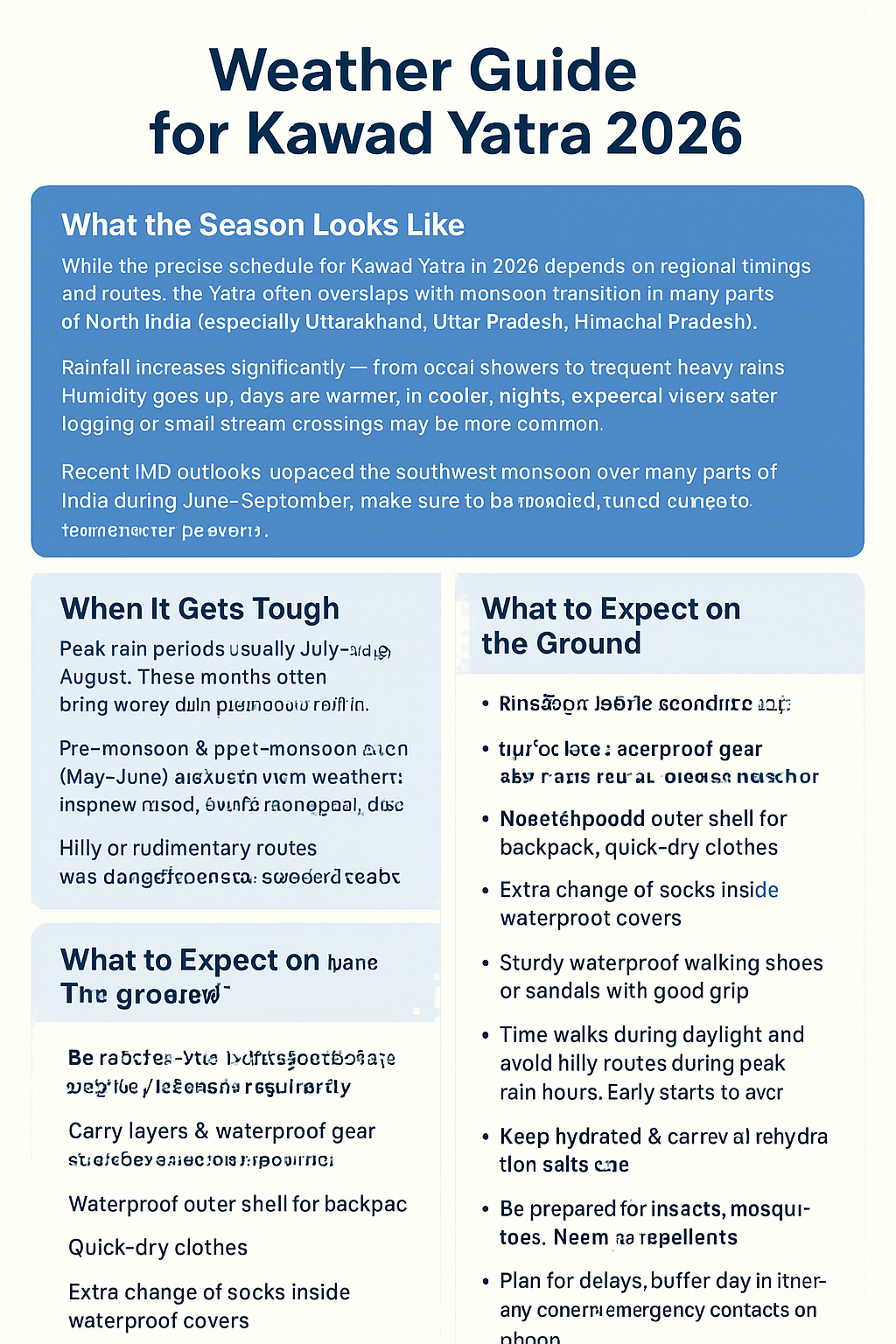
What the Season Looks Like
While the precise schedule for Kawad Yatra in 2026 depends on regional timings and routes, the Yatra often overlaps with the monsoon transition in many parts of North India (especially states like Uttarakhand, Uttar Pradesh, Himachal Pradesh etc.). This means:
- Rainfall increases significantly — from occasional showers to frequent heavy rains.
- Humidity goes up; days are warmer, nights may cool, especially in hilly or higher-altitude stretches.
- Roads, trails may become muddy or slippery, and waterlogging or small stream crossings may be more common.
According to recent IMD outlooks:
- The southwest monsoon tends to be above normal over many parts of India during June-September. Skymet Weather+3suryadreamworld.in+3India Meteorological Department+3
- Rain is likely to intensify during peak monsoon months, with heavy to very heavy rainfall at times in certain regions. India Meteorological Department+1
When It Gets Tough
- Peak Rain Periods: Usually July–August. These months often bring the worst of monsoon — heavy and sometimes continuous rainfall, possibly storms or thunderstorms.
- Pre-Monsoon & Post-Monsoon: Just before (May-June) and just after monsoon (September) there can be erratic weather — sudden downpours, fog or mist in hilly areas, cooler nights.
- Hilly or Rudimentary Routes: More danger of landslides, washed out paths, swollen streams.
What to Expect on the Ground
| Weather Aspect | Likely Conditions | Impacts & Challenges |
|---|---|---|
| Rain | Frequent showers, occasional heavy rainfall | Wet clothing, slippery paths, water-induced delays |
| Temperature | Warm/humid during day (~25-35°C in plains), cooler at higher altitudes, nights may be chilly | Risk of heat exhaustion, plus cold discomfort in hills |
| Humidity | High, especially during/after rain | Increased sweating, discomfort; risk of fungal infections |
| Visibility & Air Quality | Mist/fog in mornings or after rains; roads may get smoky or dusty in dry patches | Navigation issues; slower pace; breathing discomfort |
| Terrain | Mud, slippery stones, washed-out roads, puddles, possibly flooded sections | Need waterproof gear; good footwear; may have to take detours |
How to Prepare: Tips & Gear
- Check Local Forecasts Regularly
As Yatra dates approach, monitor IMD updates for your specific route. Weather can vary even between nearby regions in hills. - Carry Layers & Waterproof Gear
- Raincoat / poncho
- Waterproof outer shell for backpack
- Quick-dry clothes
- Extra change of socks inside waterproof covers
- Footwear
Sturdy, waterproof walking shoes or sandals with good grip. As earlier discussed. - Timing Your Walks
Try to walk in daylight and avoid hilly routes during peak rain hours (usually afternoons). Early starts help miss storms or heavy rains. - Hydration & Health
Keep yourself well hydrated; carry oral rehydration salts. Be prepared for insects/mosquitoes. Neem, mosquito nets, repellents help. - Plan for Delays
Allow buffer days in itinerary in case of rain delays, washed away bridges etc. - Safety First
Know emergency shelters or rest points. Keep emergency contacts on phone. If hail, thunderstorm or lightning, take shelter.

